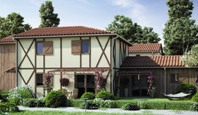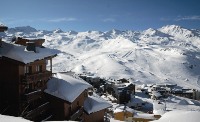
|
Leaseback is deemed a safe way of combining a French holiday home with a guaranteed source of hassle-free rental income. That said, the harsh economic climate has put pressure on developers so it's worth being choosy about what you buy. In a climate where property buyers want long-term security and rental income to cover the costs, many are looking to leaseback as the solution. In France, Government-backed leaseback developments, or 'residences de tourisme', have existed for over 20 years as a way to boost tourism in certain areas - notably the Alps, the Mediterranean coast, the Atlantic coast and Paris - and to ensure holiday homes are kept busy throughout the year. “Leaseback is definitely becoming more popular as a way to invest. People want to know their rental income is really guaranteed and they want to know that their property will be looked after out of season when they aren't there,” comments Richard Deans from MGM French Property, which has 15 leaseback projects in the French Alps. Although a familiar, and popular, way of buying holiday homes to the French – who can offset 20 per cent of the value of their leaseback property against income tax – leaseback is still unknown to many British investors. The way it works is that the buyer purchases the freehold of a furnished property then leases it back to the management company for 9-11 years initially. The buyer receives a 19.6 per cent VAT rebate and a guaranteed rental return, usually around 3-4 per cent a year. After the initial lease period is up, they can either renew for a further 9-11 years or they can break the lease arrangement – which means they will have to pay back a proportion of their tax rebate. In most leaseback arrangements, the owner can use the property for a few weeks a year – although some choose not to, particularly in city properties, to maximise their rental yield. It is a concept that most buyers and agents say works well. It is a relatively safe, long-term option and, if done properly, the guaranteed income should cover most or all of the outgoings and the property should have appreciated in value by the time the lease is up. Mortgages are widely available too and they take into account lease payments on the property as part of the affordability assessment. “These types of mortgage are attractive as they require the smallest deposit necessary to buy a house in France,” comments Thomas Foster, international mortgage consultant at Baydonhill FX. It depends on the project, but French banks will typically offer loans of around 80 per cent loan to value, with fixed rate deals of around 4.5 per cent. Athena Mortgages.com has repayment products of up to 100 per cent loan to value for leaseback properties. Shop around for the best mortgage to see if the leaseback company's preferred lenders are really giving you the best deal. Part of your due diligence should be looking thoroughly at the underlying business plan behind a leaseback project, checking that the guaranteed rental returns are realistic. Typically, a 50/50 split of the net revenue with the developer will give owners a four to five per cent yield – you need to ask if that is based on sensible occupancy levels and sensible rental rates. |
St Endreol Gold & Spa, Cote d'Azure |

Le Domaine de Rochevigne, St Emilion, Dordogne |
|
|
Hameau du Kashmir, Val Thorens 2300 |
|
|
One project promising big returns is Domaine de Lavagnac, the £425-million redevelopment of a grand 17th-Century Languedoc chateau near Beziers. The developers, The Frere Group, is promising seven per cent guaranteed rental returns, based – it says – on the fact that this is an unusually large leaseback development (650 properties compared with the usual 30 or so) and the five-star facilities, which include a championship golf course, France's biggest spa and the biggest conference centre on the Côte d'Azur bringing year-round business. It remains to be seen whether they will deliver, however, as the project is delayed in breaking ground. Many leaseback developers have been forced to hit the brakes during the downturn or failed completely. When this happened at Aiglon de Morzine in the French Alpine town of Morzine, the 12 leaseback owners didn't bother with the hassle of a lengthy legal battle – they simply took over and now run the management company themselves. Among the owners is Joanne Yellowless-Bound, CEO of ski tour operator Erna Low, who says that despite being thrown in at the deep end, the experience has not put her off leaseback. “Quite the opposite,” she says. “It's a great concept, especially for ski properties that owners only want to use for a couple of weeks a year and rent out for the rest of the time. Leaseback is a good solid investment and the British are returning to the market as many developers are now offering far more choice.” The success of a leaseback scheme depends almost entirely on the quality of the management company providing the rental guarantee. “Some rental companies have struggled to provide the yields they contractually agreed with the buyers, so they have gone into liquidation or reduced the yields considerably,” says Patricia Fevrier from A Place in France. “This leaves the owners with little choice as they are committed to the lease for at least the first nine years of ownership. Leaseback developments built and run by professionals who know what they are doing are riding the downturn well,” she says. “But you must check on the experience of the developers. Not all are offering a secure long-term way of investing.” Simple Google searches will identify who provides a good level of service. “With smaller, boutique companies, buyers need to look at their credentials far more thoroughly and really do their due diligence,” says Joanna Yellowlees-Bound, although she is confident the worst companies have been flushed out of the market during the recession. Your bank can also help. When applying for a mortgage, the bank will have an approved list of developers. “If your developer is not on the list, that company will need to be assessed and researched by the bank. This usually involves a hefty amount of paperwork,” says Baydonhill's Thomas Foster. There is also talk that the French Government is producing a blacklist of management companies who have failed investors. As further reassurance, under French law clients' deposits must be held in escrow and cannot be drawn down by the developer until there is an insurance policy in place guaranteeing the build of the property. “Deposits are fully refundable pending mortgage approval. Whatever happens, the client either gets their money back or is delivered their property as promised,” comments Charlie Williams from ecoleaseback developers Terresens UK. The other big grey area with leaseback, in many people's eyes, is how you will sell your property. Karl O'Hanlon, who runs Domaine et Demeure property company in the Languedoc, warns. “It's not just the flexibility over usage that I'm dubious about. I see selling on as the big problem. You can sell when you want, through a specialist agent, but if it's within the first nine years the developer has the right to levy a penalty, the new buyer must take over your lease and the vendor has to pay back a percentage of their VAT rebate, according to how long they have owned the property,” says O'Hanlon. For Seamus McConville, an IT consultant who runs the independent portal www.frenchleaseback.net for buyers to exchange views, information and advice, the best time to sell is after the initial lease period is up. “Your property is worth far more without the lease than with it,” he says, citing his own one-bedroom apartment at La Tania, near Courchevel. “It's worth about £130,000 at the moment, but as a freehold property on the normal market, I could sell it for £215,000,” he says. And to play safe, McConville says, he would recommend buying a resale leaseback property rather than a newbuild one. “That way, you can see what the running costs really are and how secure the management company is,” he explains. Buyers can also profit from current discounts of resale apartments – and hence higher rental yields – on developments such as the Pierre et Vacances-managed Arc 1950, where “nearly new” apartments have been reduced by up to 20 per cent. Hidden costs are a common gripe among leaseback owners. One reports an annual owners' tax of €800 (£684), annual building management costs of €500 (£427), plus solicitor's and bank charges. “The extra costs not revealed to us at the sales stage mean we will average a 4-6 per cent yield on the investment over its lifetime – stocks and shares would have probably paid the same with a lot less hassle,” the owner comments. Other complaints concern the need to translate all documents into English, even though many French leaseback projects specifically target the British market, and the poor quality of customer service and slowness in paying rent, even from the biggest leaseback companies. Check also that the management company is who you think they are and that the job hasn't been farmed out to a third party, and confirm whether the rental income you will receive is net or gross. Armed with all the right information, leaseback can be a worthwhile investment. It will never be about getting rich quick but done properly, it could leave you with a lovely property that has paid its way (for up to 22 years) before being yours to enjoy as much as you want. |
|
